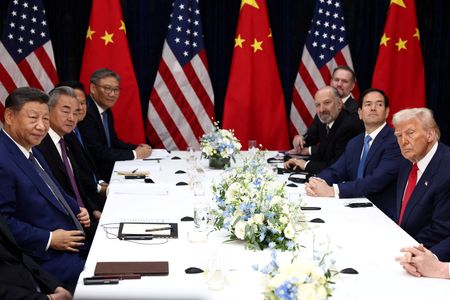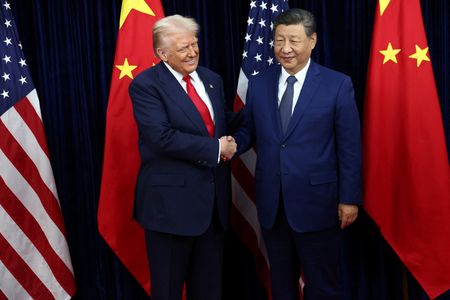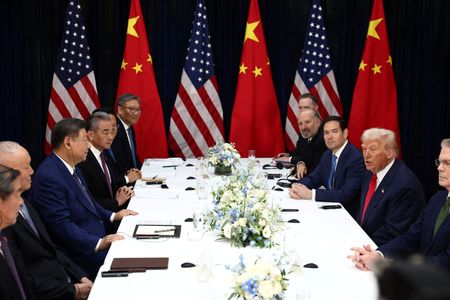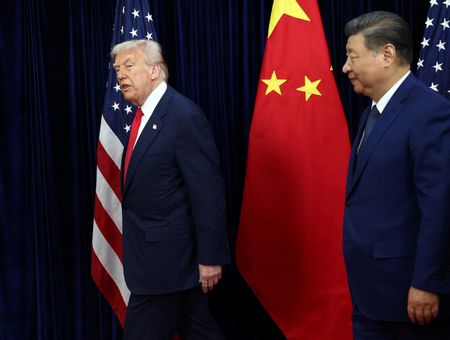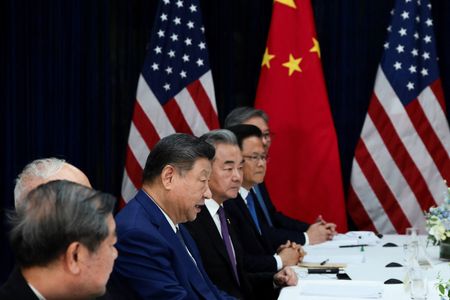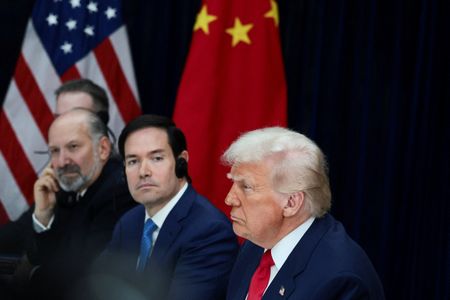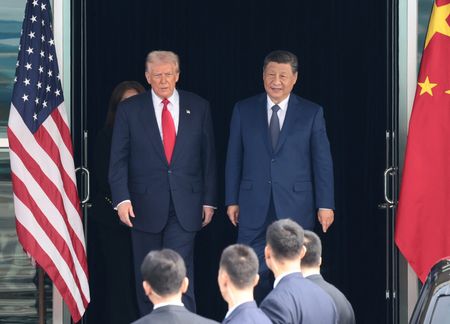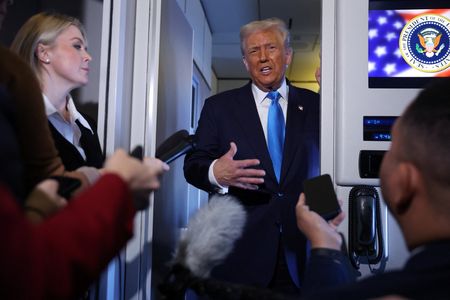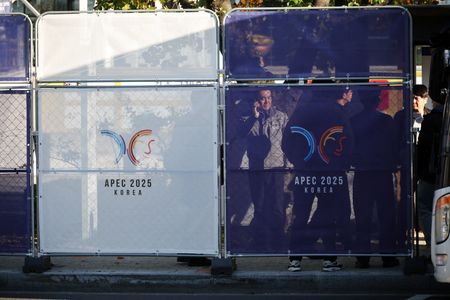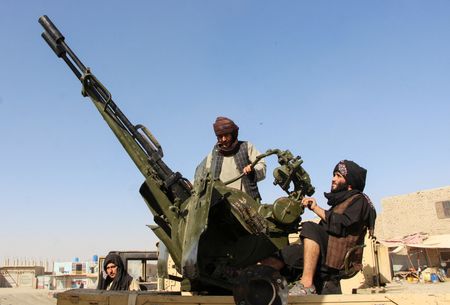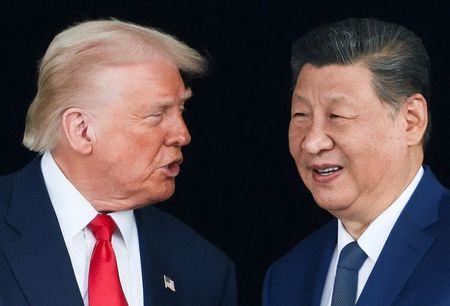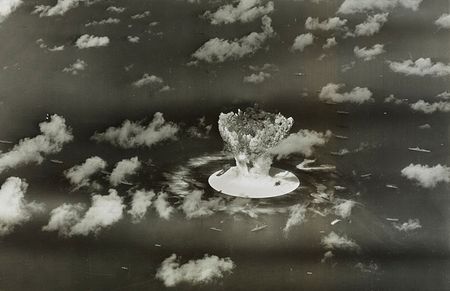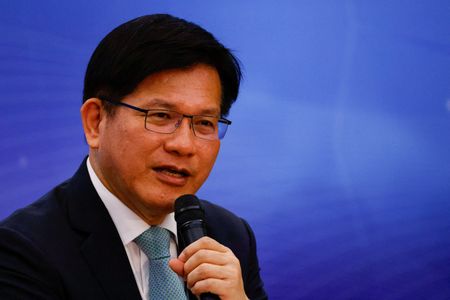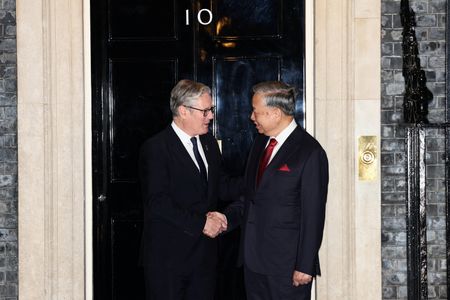By Trevor Hunnicutt
BUSAN, South Korea (Reuters) -U.S. President Donald Trump said on Thursday he had agreed with President Xi Jinping to trim tariffs on China in exchange for Beijing cracking down on the illicit fentanyl trade, resuming U.S. soybean purchases and keeping rare earths exports flowing.
Trump’s face-to-face talks with Xi in the South Korean city of Busan, their first since 2019, marked the finale of a whirlwind Asia trip on which he also touted trade breakthroughs with South Korea, Japan and Southeast Asian nations.
“It was an amazing meeting,” Trump told reporters aboard Air Force One shortly after he left Busan, ranking the talks a “12 out of 10”.
Trump said tariffs on Chinese imports would be cut to 47% from 57% by halving the rate of tariffs related to trade in fentanyl precursor drugs to 10%.
Xi will work “very hard to stop the flow” of fentanyl, a deadly synthetic opioid that is the leading cause of American overdose deaths, Trump said. The tariff was reduced “because I believe they are really taking strong action,” he added.
China agreed to pause export controls announced this month on rare earths, elements that play vital roles in cars, planes and weapons that have become Beijing’s most potent source of leverage in its trade war with the United States.
The pause would last for a year, China’s commerce ministry said in a statement, adding that the two sides had also reached consensus on fentanyl cooperation and expanding agricultural trade.
The reaction to the detente in global stock markets was muted, with major Asian indexes and European futures swinging between gains and losses.
China’s Shanghai Composite Index slipped from a 10-year high, while U.S. soybean futures were weaker.
“The response from markets has been cautious in contrast to Trump’s enthusiastic characterisation of the meeting,” said Besa Deda, chief economist at advisory firm William Buck in Sydney.
Among major U.S. trading partners, only Brazil and India are still subject to higher tariffs.
In the run-up to the meeting, world stock markets from Wall Street to Tokyo had hit records on hopes of a breakthrough in a trade war between the world’s two largest economies that has disrupted supply chains and rocked global business confidence.
The cordial meeting on the sidelines of the Asia-Pacific Economic Cooperation (APEC) summit ran for more than 1-1/2 hours.
Trump repeatedly talked up prospects of reaching agreement with Xi since U.S. negotiators on Sunday said they had agreed a framework with China to avoid 100% U.S. tariffs on its goods and defer China’s export curbs on rare earths, a sector it dominates.
FRICTIONS NOW AND THEN ARE NORMAL
It was normal for the superpowers to have frictions now and then, Xi told Trump via a translator, as the talks began at a South Korean air base.
“China’s development and rejuvenation are not incompatible with President Trump’s goal of ‘Making America Great Again,'” Xi said.
Besides trimming the fentanyl tariffs, Beijing had sought an easing of export controls on sensitive U.S. technology, and a rollback of new U.S. port fees on Chinese vessels designed to combat China’s global dominance in shipbuilding, ocean freight and logistics.
Trump made no immediate comment on U.S. concessions but said China would buy “tremendous amounts” of U.S. soybeans and other farm products “starting immediately”.
Before the summit, China bought its first cargoes of U.S. soybeans in several months, Reuters reported exclusively on Wednesday.
The White House has signalled it hopes the summit will be the first of several between the leaders in the coming year. Trump said he would travel to China in April before he receives Xi in the United States.
NO NVIDIA CHIP, TAIWAN DISCUSSIONS
Trump said he did not discuss Nvidia’s state-of-art Blackwell AI chip with Xi, despite a suggestion the previous day that he could do so.
In August, Reuters reported that Nvidia was working on a downgraded version of the Blackwell to sell to China.
In a further blow to Nvidia’s hope of maintaining its presence in China’s $50-billion AI market, Trump distanced himself from talks over Nvidia chip sales there, saying that was a matter for the company to resolve.
The contentious issue of Taiwan, the democratic island claimed by China that is a U.S. partner and high-tech powerhouse, did also not surface in the talks, Trump said.
But minutes before starting his meeting with Xi, Trump ordered the U.S. military to immediately resume testing nuclear weapons after a gap of 33 years, pointing to the growing arsenals of Russia and China.
China’s foreign ministry said on Thursday it hoped the U.S. would stick by to a moratorium on nuclear testing.
(Reporting by Trevor Hunnicutt in Busan, Michael Martina, David Brunnstrom, David Lawder and Daphne Psaledakis in Washington; Writing by John Geddie; Editing by Lincoln Feast and Clarence Fernandez)

